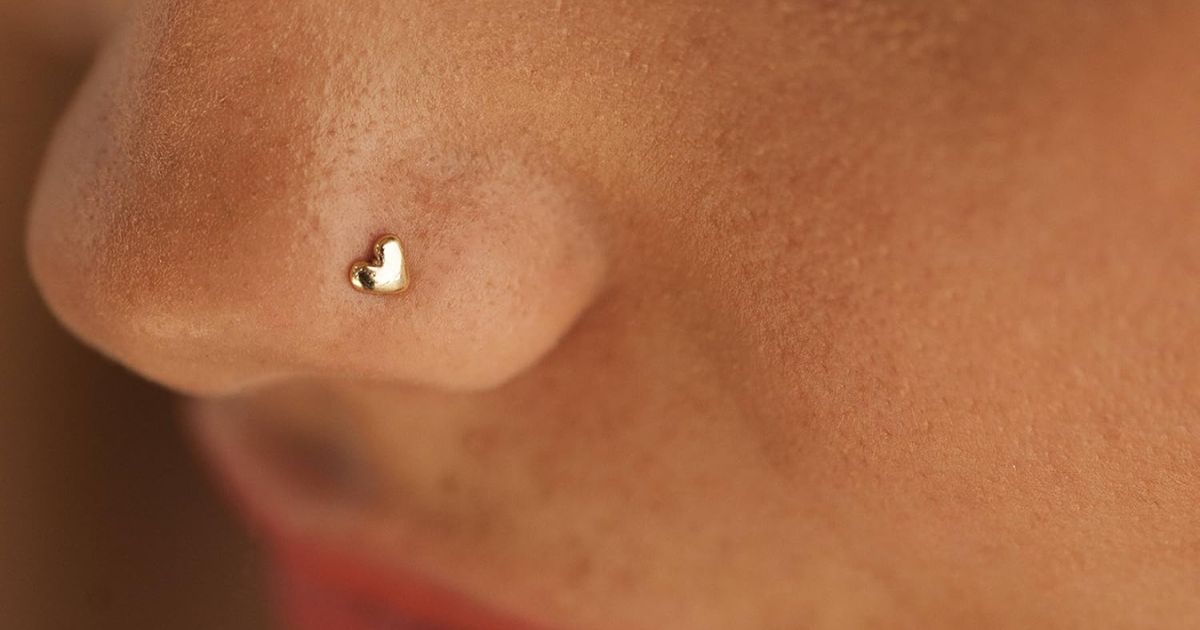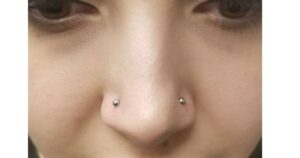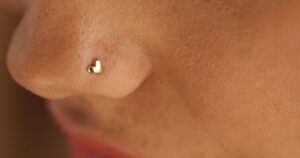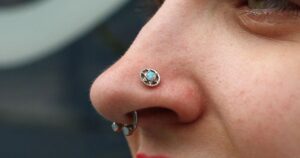A nose piercing involves inserting a piece of jewelry into the skin or cartilage of the nose. It’s a popular form of body modification and self-expression. Common locations include the nostril, septum, and bridge. Nose piercings have cultural significance in many societies around the world.
Are you struggling with your nose piercing and wondering how to care for it? Many people have found relief using natural remedies. One popular question is, Can I put tea tree oil on my nose piercing?
Yes, you can put tea tree oil on your nose piercing, but it’s important to dilute it first. Tea tree oil has natural antiseptic properties that can help prevent infections. However, using it undiluted can cause irritation or dryness. Always mix a few drops with a carrier oil or water before applying.
Safety Precautions

When using tea tree oil on your nose piercing, safety precautions are essential to prevent irritation or adverse reactions. Always dilute tea tree oil with a carrier oil, such as coconut or jojoba oil, to minimize its potency and avoid skin irritation. A common dilution ratio is one to two drops of tea tree oil mixed with a teaspoon of carrier oil. Before applying the diluted solution to your piercing, perform a patch test on a small area of your skin to ensure you don’t have an allergic reaction.
In addition to proper dilution, it’s important to use tea tree oil sparingly and observe your piercing for any signs of irritation, such as redness, itching, or swelling. If any adverse reactions occur, discontinue use immediately and cleanse the area with saline solution. Avoid using tea tree oil on a fresh piercing until it has healed significantly, as it can be too harsh for newly pierced skin.
Importance of Dilution
The importance of dilution when using tea tree oil on a nose piercing cannot be overstated. Tea tree oil is highly concentrated and potent, which means applying it directly to the skin can cause irritation, burning, or allergic reactions. By diluting it with a carrier oil like coconut or jojoba oil, you reduce the risk of these adverse effects while still benefiting from its antiseptic properties. Proper dilution ensures that the tea tree oil can help prevent infections and promote healing without causing additional harm to the delicate skin around your piercing.
Choosing the Right Carrier Oil
Choosing the right carrier oil is essential when using tea tree oil on your nose piercing to ensure it is safe and effective. Carrier oils, such as coconut oil, jojoba oil, and almond oil, help dilute the tea tree oil, reducing the risk of skin irritation and allowing for better absorption. Each carrier oil has unique properties; for example, coconut oil has antimicrobial benefits, while jojoba oil closely resembles the skin’s natural sebum, making it a gentle option. When selecting a carrier oil, consider your skin type and any allergies to ensure the best care for your piercing.
how to use tea tree oil on piercing bump
Using tea tree oil on a piercing bump can be an effective way to reduce inflammation and promote healing. First, ensure you have 100% pure tea tree oil and a suitable carrier oil, such as coconut or jojoba oil. Mix one drop of tea tree oil with a teaspoon of the carrier oil to dilute it properly, as undiluted tea tree oil can be too strong and cause irritation. Once diluted, soak a cotton ball or swab in the mixture and gently apply it to the piercing bump twice a day.
It’s important to monitor your skin’s reaction to the tea tree oil mixture, especially if you have multiple nose piercings at once. If you notice any redness, increased irritation, or discomfort, discontinue use immediately and consult a professional piercer or healthcare provider. Consistency is key, so continue applying the diluted tea tree oil mixture until the bump diminishes. Keeping the piercing clean and avoiding unnecessary touching or twisting can also help promote healing and prevent further irritation.
how to dilute tea tree oil for piercing
Diluting tea tree oil for piercings is essential to avoid irritation and potential damage to the skin. To properly dilute the oil, mix one to two drops of tea tree oil with a tablespoon of a carrier oil, such as coconut oil, jojoba oil, or olive oil. Alternatively, you can dilute tea tree oil with water by adding a few drops to a cup of distilled or boiled water. This mixture can be applied to the piercing with a clean cotton swab or pad.
When using the diluted tea tree oil, gently apply it around the piercing area, ensuring it does not enter the piercing hole itself. It is important to use clean hands and tools to prevent introducing bacteria to the piercing. Start by applying the diluted oil once a day and monitor your skin’s reaction. If there is no irritation, you can gradually increase the application to twice a day. Always observe for any signs of adverse reactions, such as redness, swelling, or increased pain, and discontinue use if any occur.
how to dilute tea tree oil for piercing bump
To safely dilute tea tree oil for a piercing bump, start by mixing a few drops of the essential oil with a carrier oil like coconut or jojoba oil. A common ratio is 1 drop of tea tree oil to 1 teaspoon of carrier oil, which helps ensure the tea tree oil is not too concentrated and reduces the risk of irritation. Gently stir the mixture and apply it to the affected area with a clean cotton swab or pad.
It’s important to use this diluted mixture sparingly and only once or twice a day to avoid overuse. Applying too much can cause dryness or an allergic reaction. Always perform a patch test on a small area of skin before applying the mixture to your piercing to ensure you don’t have a sensitivity to the oil.
best tea tree oil for piercing bump
When dealing with a piercing bump, choosing the best tea tree oil can make a significant difference in your healing process. Look for pure, high-quality tea tree oil with a concentration of 100%, and ensure it’s from a reputable brand to avoid any impurities. A well-reviewed option often has a history of effective use in treating piercing bumps, and it should be free of additives or synthetic fragrances that could cause irritation.
Additionally, selecting a tea tree oil that comes with a dropper or easy-to-use applicator can help you apply it precisely and in the right amount. Remember to dilute the oil with a carrier oil, like jojoba or coconut oil, to minimize any risk of irritation. Regular use, combined with proper care and hygiene, can help reduce the bump and promote quicker healing of your piercing.
tea tree oil piercing infection
| Feature | Tea Tree Oil A | Tea Tree Oil B | Tea Tree Oil C |
| Brand | PureTea Essentials | Nature’s Best | Heal & Shine |
| Concentration | 100% Pure | 100% Pure | 100% Pure |
| Carrier Oil Included | No | Yes (Jojoba) | No |
| Packaging | Dropper Bottle | Roll-On Applicator | Dropper Bottle |
| Price | $15 for 10 ml | $18 for 10 ml | $14 for 10 ml |
| Customer Rating | 4.5 stars | 4.7 stars | 4.4 stars |
| Special Features | Organic, cruelty-free | Organic, includes carrier oil | Organic, therapeutic grade |
| Best For | General use | Sensitive skin and easy application | General use |
| Dilution Needed | Yes | No | Yes |
| Pros | High purity, good for general use | Convenient, gentle on skin | Therapeutic grade, good value |
| Cons | Requires dilution | Higher price | Requires dilution |
This table highlights key aspects of different tea tree oils to help you choose the best one for treating piercing infections.
FAQ,S
How do I use tea tree oil on my nose piercing?
Dilute a few drops of tea tree oil with a carrier oil and gently apply it to your nose piercing once or twice a day.
Is tea tree oil safe for healing piercings?
Yes, tea tree oil can be safe for healing piercings if properly diluted and used with caution.
Can we put tea tree oil in nose?
Yes, you can put diluted tea tree oil in your nose, but it should be used with caution and under the guidance of a healthcare professional.
How to dilute tea tree oil?
To dilute tea tree oil, mix 1-2 drops of the oil with 1 teaspoon of a carrier oil, like coconut or jojoba oil.
How to make a piercing heal faster?
To make a piercing heal faster, keep it clean, avoid touching it, and follow your aftercare instructions carefully.
Conclusion
In conclusion, proper care is essential for speeding up the healing process of a piercing. Using high-quality products and following recommended aftercare guidelines can significantly reduce the risk of infection and promote faster recovery.
Remember to keep your piercing clean, avoid unnecessary irritation, and consult with a professional if you encounter any issues. By taking these steps, you’ll help ensure a smoother and quicker healing experience.








